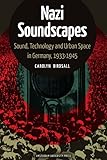Nazi soundscapes : sound, technology and urban space in Germany, 1933-1945 / Carolyn Birdsall.
Material type: TextPublication details: Amsterdam : Amsterdam University Press, (c)2012.Description: 1 online resource (272 pages) : illustrations, mapsContent type:
TextPublication details: Amsterdam : Amsterdam University Press, (c)2012.Description: 1 online resource (272 pages) : illustrations, mapsContent type: - text
- computer
- online resource
- 9789048516322
- 9048516323
- 9781283698368
- Nationalsozialistische Deutsche Arbeiter-Partei
- Propaganda -- Germany -- History -- 20th century
- Mass media and propaganda -- Germany -- History -- 20th century
- Social control -- Germany -- History -- 20th century
- History
- Nazi
- Urban Cities
- Media Technology
- Propaganda
- Geschiedenis
- Soundscapes
- Germany
- Radio
- Listening
- Popular Music
- HM1231 .N395 2012
- COPYRIGHT NOT covered - Click this link to request copyright permission: https://lib.ciu.edu/copyright-request-form
| Item type | Current library | Collection | Call number | URL | Status | Date due | Barcode | |
|---|---|---|---|---|---|---|---|---|
 Online Book (LOGIN USING YOUR MY CIU LOGIN AND PASSWORD)
Online Book (LOGIN USING YOUR MY CIU LOGIN AND PASSWORD)
|
G. Allen Fleece Library ONLINE | Non-fiction | HM1231 (Browse shelf(Opens below)) | Link to resource | Available | ocn810232657 |
Includes bibliographies and index.
COPYRIGHT NOT covered - Click this link to request copyright permission:
https://lib.ciu.edu/copyright-request-form
Many images of Nazi propaganda are universally recognizable, and symbolize the ways that the National Socialist party manipulated German citizens. What might an examination of the party's various uses of sound reveal? In Nazi Soundscapes, Carolyn Birdsall offers an in-depth analysis of the cultural significance of sound and new technologies like radio and loudspeaker systems during the rise of the National Socialist party in the 1920s to the end of World War II. Focusing specifically on the urban soundscape of Düsseldorf, this study examines both the production and reception of sound-based propaganda in the public and private spheres. Birdsall provides a vivid account of sound as a key instrument of social control, exclusion, and violence during Nazi Germany, and she makes a persuasive case for the power of sound within modern urban history.
Affirmative Resonances in Urban Space -- The Festivalisation of the Everyday -- Mobilising Sound for the Nation at War -- Cinema as a Gesamtkunstwerk? -- Afterword: Echoes of the Past.
There are no comments on this title.
